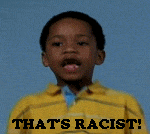God forbid Whitey gets a club based on race. Of course......
Official campus recognition of a student white-rights group, over the protests of campus civil rights advocates, has created fears of heightened racial tension at the University of Florida.
The recognition, which university officials say is automatic for organizations that produce a constitution and have a faculty adviser, makes the group, the White Student Union, eligible for student government financing.
The founder of the group, Mark Wright, says it was established to protest affirmative-action legislation and other forms of ''preferential treatment based on race.'' The engineering junior said that despite charges leveled by protesters, no one in his club is a racist.
''What protesters are missing in the hysteria is the fact that they are violating their own principles,'' Mr. Wright said. ''They prejudged us. They stereotyped us when they said, 'Whites can't form a group without being racist,' and they weren't open to new ideas.''
The group's faculty adviser, Russell Schneider, a teaching assistant who works as a tutor in the Reading Center, said he was interested in the group's ideas, but added: ''If I see Mark Wright's group, either in actions or words, taking racist actions, then I'll back off.''
Application Is Accepted
For a month, protest groups, including the campus Coalition Against Bigotry, urged the university to refuse Mr. Wright's application, but administrators said they would not engage in censorship and noted that the White Student Union met the requirements for campus recognition. Administrators said the group could not be refused because it met the only two requirements for clubs, a constitution and a faculty adviser.
Eugene LaMothe, a senior from Aledo, Tex., and a leader of the Coalition Against Bigotry said, ''This organization is coming at a time when we should be working together to break down racial barriers. This is promoting an already stressful situation.''
John Lombardi, who was recently appointed president of the university, said the organization's members have the right to speak their minds, but he does not have to like it. ''It's unfortunate that there are any students at the university who are opposed to our efforts to represent the constituency of the state,'' Mr. Lombardi said. ''Affirmative-action legislation is our commitment to getting that to happen.''
To improve the situation for minority-group members on campus, administrators appointed 19 faculty members and students to a Quality of Life Task Force in December, instructing them to investigate the problems facing minorities and to formulate possible solutions.
Recommendations discussed by the task force include a mandatory class in cultural diversity, and increasing the number of role models for minority students by stepping up the hiring of minorities.
University officials also set up a Student Advisory Board to examine the procedures of the campus police. Black organizations have accused the police of harassing black men. The group has met weekly and officers have been enrolled in cultural-awareness and sensitivity courses.
Black students also protested the selection of President Lombardi by the Florida Board of Regents. They said racism and sexism played a role in the decision to pass over the other finalist, Marguerite Ross Barnett, a black woman who is the chancellor of the University of Missouri at St. Louis.
